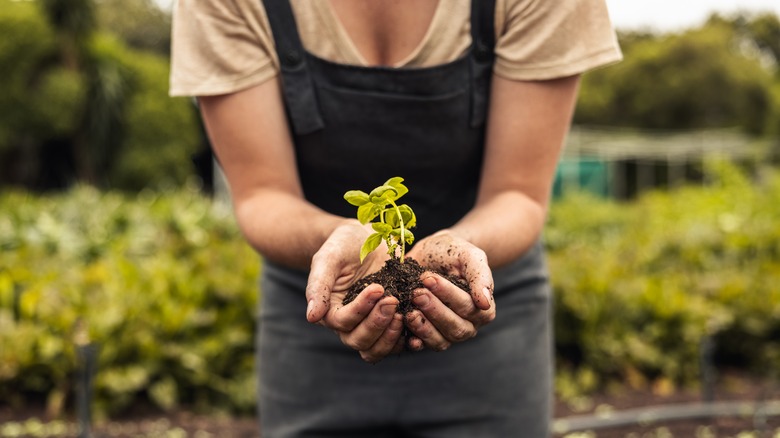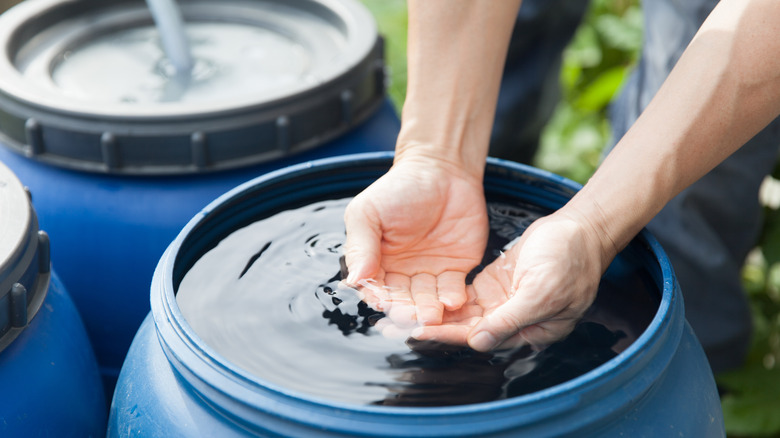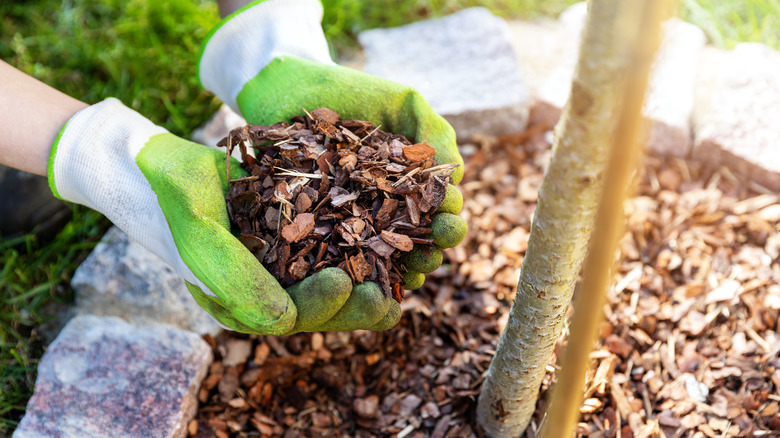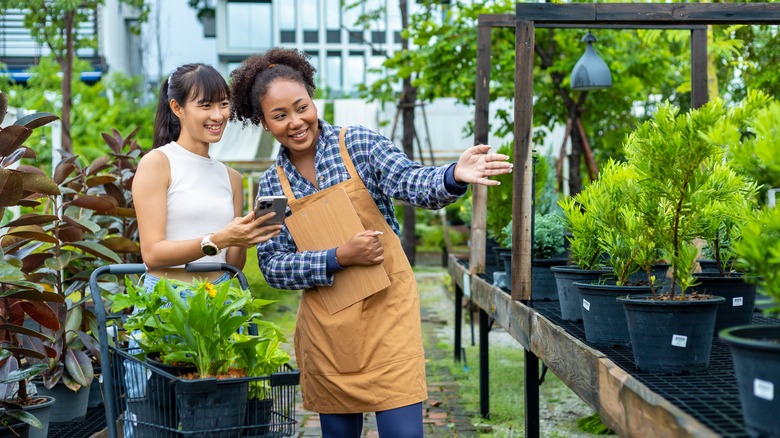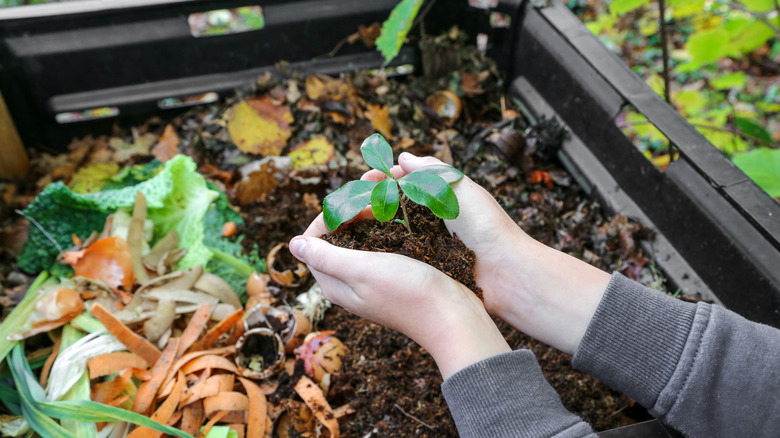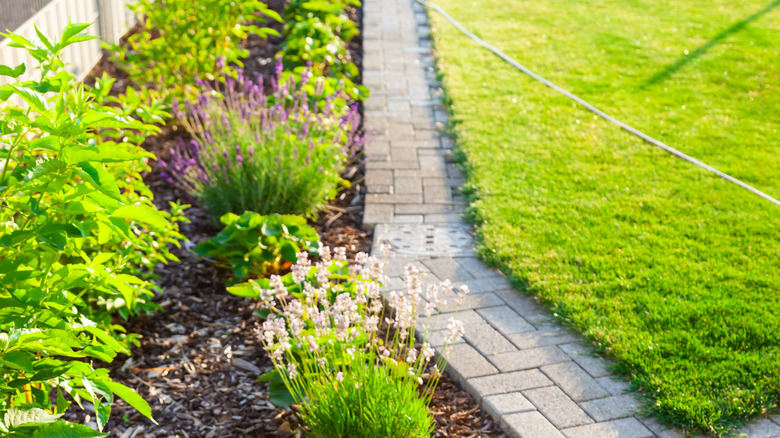How To Make Your Garden More Sustainable, According To An Expert
With so much focus on the importance of keeping our environment healthy, it may seem a little daunting to determine how you can do your part. Luckily, there is a simple way to help the climate around you, and it can start in your own backyard. Tending a sustainable garden has many lasting effects not only on your own health but also on the area in which you live. Whether you're planting a delicious veggie garden or putting in new trees and flowers in your outdoor space, it can directly benefit the climate. Cultivating new life in your backyard boosts the strength and nutrients in your soil and makes it more healthy for future growth, according to Green Matters. Greenery in your garden also eliminates harmful CO2 and turns it into oxygen while attracting helpful pollinators such as butterflies and bees. Not to mention, having a robust vegetable and fruit crop growing outside of your home helps reduce your grocery bill and the need for supermarket produce which comes with its own carbon emission footprint.
But what are some key elements to making your home garden more sustainable? In an exclusive interview with House Digest, Liz Will, a Master Gardener through Michigan State University Extension, a certified garden coach and consultant, and the founder of Learn to Grow Gardens, helps explain the many ways to increase the sustainability of your own garden.
Use less water
Practicing good water conservation in the home is a vital way to help reduce wasted resources. But what are the best practices for your garden? "One of the most important things we can do to make our garden more sustainable is to limit the amount of water we use," expert Liz Will told House Digest, "Some of the ways we can do that include collecting rainwater, selecting native species, and installing drip irrigation." Establishing rain barrels around the outside of your home to catch the runoff water that would otherwise be wasted is the simplest and most effective way of reducing the water needs of your garden. Without having to resort to turning on your garden hose, recycled water also lowers your energy and water costs, especially during the summer months when hydro bills surely soar.
It can also be a good idea to utilize a different watering technique that deviates from the standards. "Drip irrigation uses much less water than overhead watering," Will mentions, "It does this by providing water directly where it's needed, in a slow drip, which reduces runoff and evaporation." She also notes that there is an ideal time of day to make certain that you are making the most out of your watering sessions. "Watering plants early in the morning, or in the evening after the temperatures have cooled down, prevents water from evaporating before the plants have a chance to use it."
Bring in mulch
Another key to making your garden more sustainable is to protect certain areas so that resources are not wasted. One sure way to give the soil in your garden the defense it needs is to incorporate a layer of mulch. "Mulch does more than make the garden look neat and tidy," Master Gardener Liz Will mentions, "Mulch covers the surface of the garden and reduces evaporation. This, in turn, reduces the amount of water needed." Mulch can be made of different organic materials to create a protective barrier for your garden. To make some of your own mulch, use tree bark, pine needles, straw, leaves, small branches, and even grass clippings, as per Modern Farmer. Will suggests that "A 2- to 3-inch layer will retain soil moisture and help prevent weeds." Utilizing mulch as a natural defense against weeds also helps eliminate the need for harmful weed killers.
Along with soil protection from the sun and helping to shield your plants from the harmful effects of everyday lawn care, such as mowing and trimming, mulch is also beneficial to the dirt of your garden as it goes through the process of natural decay. The nutrients from the mulch are absorbed by the surrounding soil, hopefully enabling it to be more fertile and strong. This material can be advantageous for your garden beds and the base of trees or bushes around your property.
Choose the right plants
To ensure that your sustainable garden flourishes throughout the growing season, it helps to have the correct species of plants mingling together. "Native plants will naturally thrive in your local environment," expert Liz Will says, "Through natural selection, they've become resistant to many pests and diseases found in your yard, and have acclimated to your annual rainfall." When planning a garden, it is important to look beyond the simple beauty of the flowers and plants you choose and instead select from ones that work in the environment that you live in. Although this may take a little more research and effort to find the right plant for the right place, you may find that a more selective strategy could lead to your plants lasting longer and prospering in their own natural habitat.
If you like the look of more exotic plant life, then you should keep some things in mind before adding them to your garden at home. "When choosing non-native species, keep watering needs in mind," Will suggests, "Select plants that don't require lots of supplemental watering, and that thrive in your environment without a lot of help from you." This is a perfect ideology for a sustainable garden. You should almost want to strive for a garden domain that allows nature to effortlessly take over. By sticking with native plants, you are one step closer to having a garden that wouldn't look out of place with its natural surroundings.
Make your own compost
When plotting a home garden, it is beneficial to have rich soil so your plant life can survive and thrive throughout the year. However, when you want to keep your gardening activities environmentally friendly, you should stay clear of store-bought fertilizers. By purchasing these types of products from stores, you're contributing to the carbon footprint that brought the item to the store and the added waste from the packaging they're kept in. To stick with the sense of sustainability, there is another option for ensuring healthy soil. "Compost is a powerhouse in the garden, providing nutrients to plants and building up the structure and health of your soil," Liz Will tells us, "It attracts beneficial organisms, which can reduce the need for pesticides and fertilizers."
A composter in your backyard is the perfect way to save your beneficial organic waste at home and use it to improve the health of your garden. Will mentions, "Making your own compost is easy, and further reduces waste by reusing food scraps, yard waste, and some paper products and keeping them out of the landfill." When organic foods are sent to landfills instead of being utilized in home composters, they contribute to the build-up of greenhouse gasses such as methane which is harmful to the environment, according to the United States Environmental Protection Agency. So to cut costs, eliminate waste, and make your garden more sustainable, incorporate homegrown compost into your soil.
Replace or reduce your lawn
Adopting a sustainable way of life around your garden may make you look at the overall picture of your property and how it affects the environment around you. When you step back and survey your surroundings, there are more ways in which you can get the most out of your land. "Lawns require a lot of water, fertilizers, and weed killers to stay lush, green, and weed-free," garden expert Liz Will says, "The chemicals from fertilizers and weed killers ultimately end up in the local freshwater ecosystem, harming fish and wildlife." Not to mention, large lawns are a time waster as well. Consider the amount of effort that you spend mowing your grass, trimming the edges, and the clean-up involved after you are finished. Plus, lawns serve little to help the environment and are mainly used as a status symbol to improve the curb appeal look of our homes.
Instead of wasting valuable resources on preserving your green grass, Will has another idea that could better suit your home. "By reducing the amount of lawn to maintain, you can greatly reduce your water and chemical usage, along with the amount of chemical runoff making its way into your local water source." She suggests that instead of dedicating large square footage of grass space around the outside of your home, "You can replace your lawn with perennial shrubs, garden beds filled with native plants, outdoor patios, or by adding a dry river bed or rock garden."
